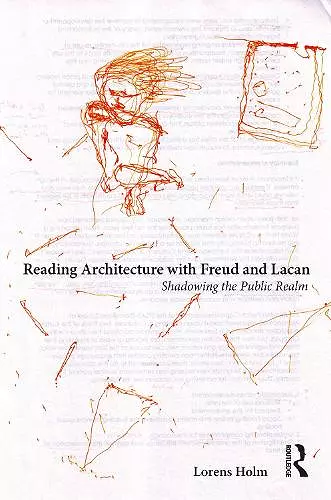Reading Architecture with Freud and Lacan
Shadowing the Public Realm
Format:Paperback
Publisher:Taylor & Francis Ltd
Published:30th Sep '22
Currently unavailable, and unfortunately no date known when it will be back
This paperback is available in another edition too:
- Hardback£145.00(9780367077983)

Reading Architecture with Freud and Lacan: Shadowing the Public Realm methodically outlines key concepts in psychoanalytic discourse by reading them against key modern and post-modern architects. It begins with what is, arguably, the central concept for each discipline by putting the unconscious in a dialectic relation to space. Each subsequent chapter begins with a detail in architectural discourse, a kind of provocation that anchors each excursion into the thought of Freud and Lacan. The text is cyclical, episodic, and cloudlike rather than expository; the intention is not simply to explain the concept of the unconscious but, to different degrees, perform it in the text. The book offers powerful critiques of current planning practice, which has no tools to address our attachment to places. It concludes with powerful critiques of our incapacity to change the environmentally damaging ways we live our lives, which is an effect of our incapacity to recognise the presence of the death drive in our nature. The text is an extended thesis – spanning the chapters – that the field of the Other is the common grammar that organises subjects into civilisations, which has consequences for how we treat the public realm in architecture, politics, and the city. The field of the Other is a slightly different slice through the urban social world. It shadows – but does not correspond exactly to – more familiar categories like private/public, inside/outside, figure/ground, or piazza/boulevard.
Reading Architecture with Freud and Lacan will be an essential resource to anyone interested in how the environment we build is a reflection of our desire. Psychoanalysis is one of the great humanist discourses of the 20th century and this book will be a valuable reference to the humanist in architects, planners, and social scientists, whether they are students, professionals, or amateurs. It will appeal to historians of the 20th century, and to psychoanalysts and architects who are interested in how their respective discourses interdigitate with each other and with other discourses.
"It is with a sense of urgency, but also a lightness of touch, that Holm draws on his intimate knowledge of Lacan’s work to address architecture in this time of climate crisis. Aiming to ‘reboot’ architecture’s ethical potential, Holm takes us through some of most challenging theoretical twists of psychoanalysis. Erudite and witty, ‘wreck[ing] havoc with linear arguments, clear categories, and objective forms of research,’ Holm dedicates his precise – and kind – intelligence to flagging our urgent need for Lacan’s understanding of the unconscious as a space of inter-subjectivity. Holm argues that via Lacan we can change our culture – as one that values individuality above all else – ‘all fantasies of the ego’ – and instead grasp architecture’s capacity for articulating the relation between individual and collective. This is Holms best book on architecture and Lacan yet, and makes for some gripping, yet vital reading."
Professor Jane Rendell, author of The Architecture of Psychoanalysis (2017), the Bartlett School of Architecture
"Lorens Holm’s highly informative primer on the relation between architecture and psychoanalysis will be much welcomed. The two disciplines have recently entered a productive dialogue and in this respect Reading Architecture with Freud and Lacan in its rigour and cogency is a major contribution to both."
Nadir Lahiji, author of the most recent Architecture in the Age of Pornography: Reading Alain Badiou
"Lorens Holm’s highly informative primer on the relation between architecture and psychoanalysis will be much welcomed. The two disciplines have recently entered a productive dialogue and in this respect Reading Architecture with Freud and Lacan in its rigour and cogency is a major contribution to both".
Nadir Lahiji, author of Architecture in the Age of Pornography: Reading Alain Badiou
"It is with a sense of urgency, but also a lightness of touch, that Holm draws on his intimate knowledge of Lacan’s work to address architecture in this time of climate crisis. Aiming to ‘reboot’ architecture’s ethical potential, Holm takes us through some of the most challenging theoretical twists of psychoanalysis. Erudite and witty, ‘wreck[ing] havoc with linear arguments, clear categories, and objective forms of research,’ Holm dedicates his precise – and kind – intelligence to flagging our urgent need for Lacan’s understanding of the unconscious as a space of inter-subjectivity. Holm argues that via Lacan we can change our culture – as one that values individuality above all else – ‘all fantasies of the ego’ – and instead grasp architecture’s capacity for articulating the relation between individual and collective. This is Holm's best book on architecture and Lacan yet, and makes for some gripping, yet vital reading".
Jane Rendell, author of The Architecture of Psychoanalysis, Professor of Critical Spatial Practice, The Bartlett School of Architecture, UCL
ISBN: 9780367077990
Dimensions: unknown
Weight: 420g
160 pages